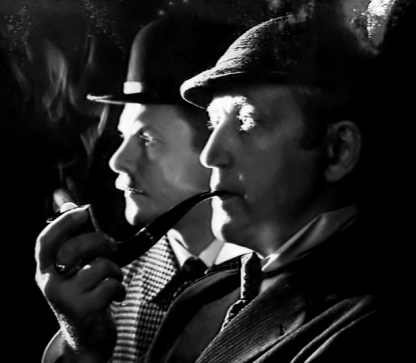

(Dr. Watson and Sherlock Holmes in Soviet TV series on the book)
Arthur Conan Doyle’s Dr. Watson found it impossible — despite great curiosity — to ask Sherlock Holmes about his profession the first few weeks they were roommates. It was just not a proper thing to do — to ask someone what he does for a living. What business is this of yours? (Eventually he asked him inadvertently, when they were talking about Holmes’s article in a newspaper — and Holmes mentioned his work first.)
Obviously, women and men dressed more modestly than today. But modesty is much more than about dress — it’s about treasuring of privacy, as the example of Dr. Watson shows. That is why women in Judaism do not take such a public role — for them, privacy is much more precious than for men (for whom it is nevertheless also very important).
Nowadays, people do not find it problematic to ask you about what it is you do. The idea of privacy is not at all what it used to be. As a result, rabbis (or rebbetzins) have to explain to girls about the idea of tznius. Back in the day, it was self-understood, and nobody thought in terms of “How is this going to lead to sex?” Anybody (even a goy) from 19th century would find this question silly. After all, you refrain from walking outside in your underwear not because you’re afraid it will lead to undesired sex. It’s an issue of privacy.
The idea that the most important, most precious, most holy things are done and kept in private has existed in Judaism for millenia.
Also, Dr. Watson carried a gun with himself at all times. Carrying a gun for protection was normal in England until socialism, with the appropriate results:
The Mumbai massacre could happen in London tomorrow; but probably it could not have happened to Londoners 100 years ago.Finally, every man obviously wore a hat.In January 1909 two such anarchists, lately come from an attempt to blow up the president of France, tried to commit a robbery in north London, armed with automatic pistols. Edwardian Londoners, however, shot back – and the anarchists were pursued through the streets by a spontaneous hue-and-cry. The police, who could not find the key to their own gun cupboard, borrowed at least four pistols from passers-by, while other citizens armed with revolvers and shotguns preferred to use their weapons themselves to bring the assailants down.
Today we are probably more shocked at the idea of so many ordinary Londoners carrying guns in the street than we are at the idea of an armed robbery. But the world of Conan Doyle’s Dr Watson, pocketing his revolver before he walked the London streets, was real. The arming of the populace guaranteed rather than disturbed the peace.
That armed England existed within living memory; but it is now so alien to our expectations that it has become a foreign country. Our image of an armed society is conditioned instead by America: or by what we imagine we know about America. It is a skewed image, because (despite the Second Amendment) until recently in much of the US it has been illegal to bear arms outside the home or workplace; and therefore only people willing to defy the law have carried weapons.
In the past two decades the enactment of “right to carry” legislation in the majority of states, and the issue of permits for the carrying of concealed firearms to citizens of good repute, has brought a radical change. Opponents of the right to bear arms predicted that right to carry would cause blood to flow in the streets, but the reverse has been true: violent crime in America has plummeted.
There are exceptions: Virginia Tech, the site of the 2007 massacre of 32 people, was one local “gun-free zone” that forbade the bearing of arms even to those with a licence to carry.
In Britain we are not yet ready to recall the final liberty of the subject listed by William Blackstone in his Commentaries on the Laws of England as underpinning all others: “The right of having and using arms for self-preservation and defence.” We would still not be ready to do so were the Mumbai massacre to happen in London tomorrow.
“Among the many misdeeds of British rule in India,” Mahatma Gandhi said, “history will look upon the act depriving a whole nation of arms as the blackest.” The Mumbai massacre is a bitter postscript to Gandhi’s comment. D’Souza now laments his own helplessness in the face of the killers: “I only wish I had had a gun rather than a camera.”
On the other hand, the perverse custom of shaving was prevalent — although it’s not clear how negative a reaction to a full beard would be then comparing to now. In any event, Victorian England was definitely not a strange mixture of ultra-liberal, homosexual, pacifist society and a socialist police state that UK is today.
1 comment:
Good post. Holmes stayed clear, as I recall, of guns. The 7% solution...well maybe that should be another post.
Post a Comment